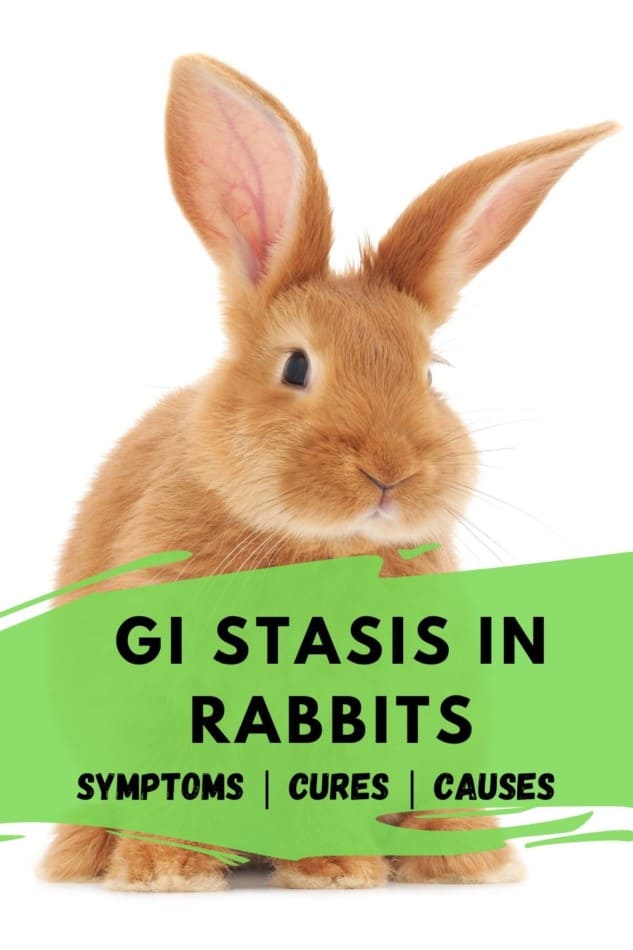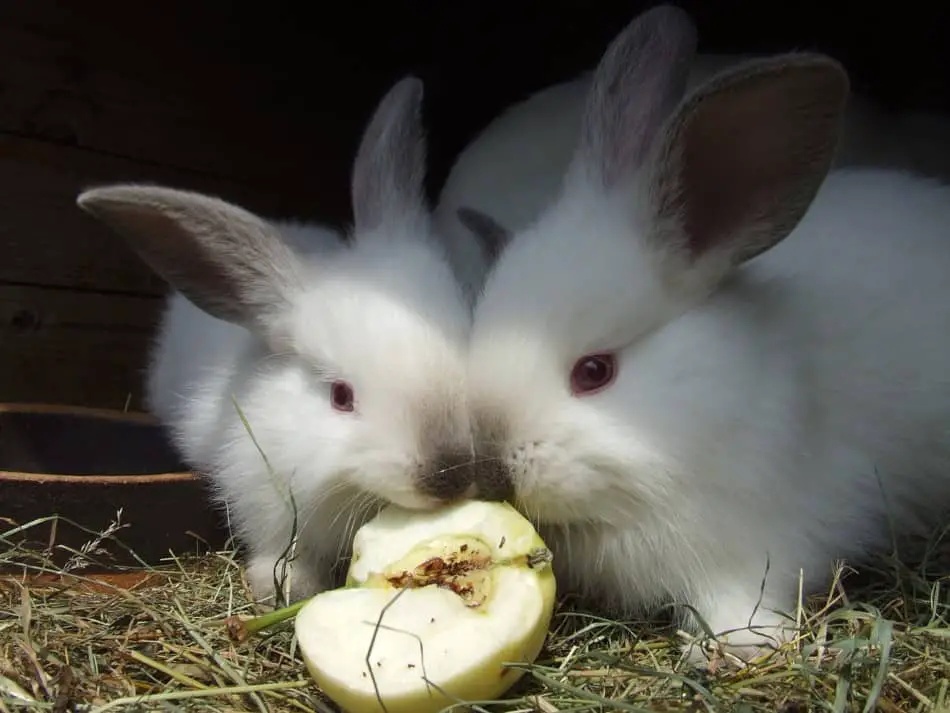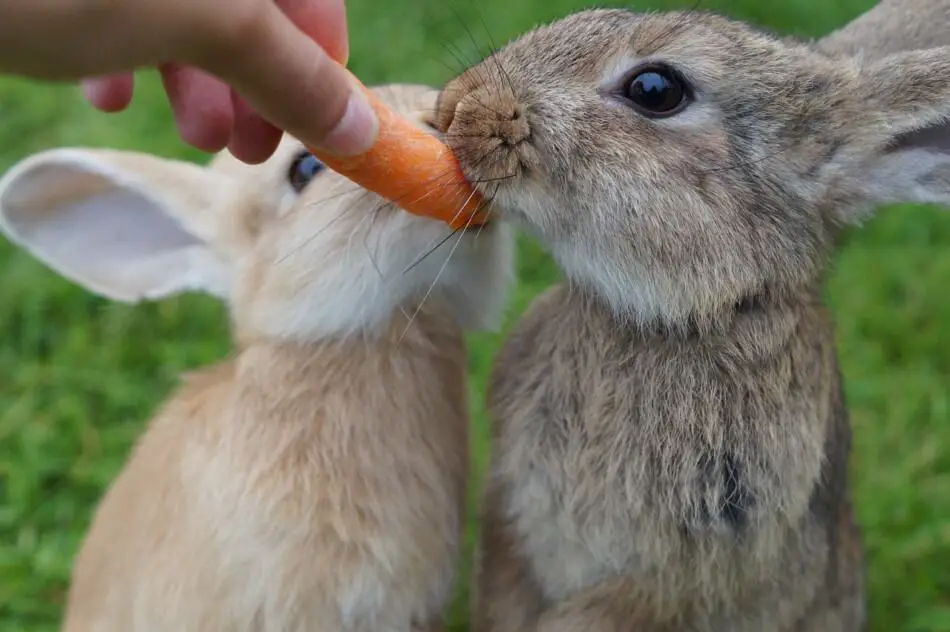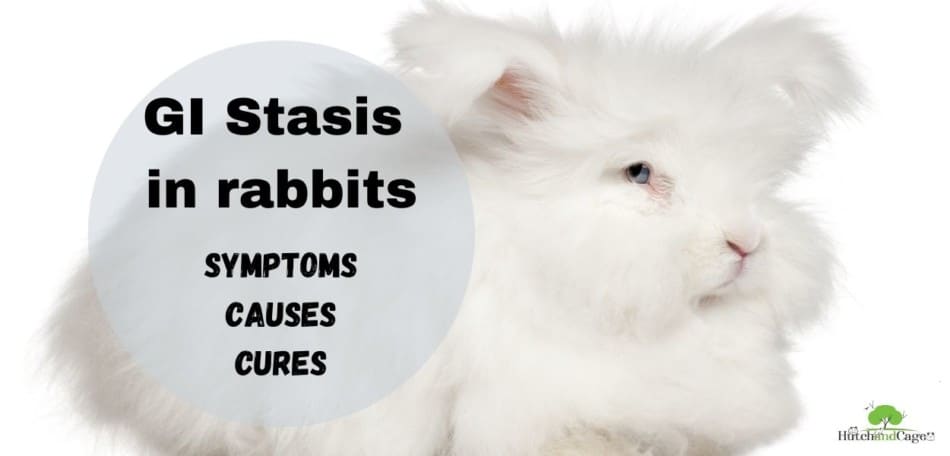GI stasis in rabbits is a possibly deadly disease found in pet rabbits. Gastrointestinal stasis is a condition where the rabbit’s digestive system stops completely or slows down drastically.
This condition allows the dangerous bacteria to increase in your rabbit’s intestines. This build-up of bacteria causes gas to be released into your rabbit’s digestive system. And, gas causes painful bloating. Because your rabbit is in pain, his appetite will decrease. And, this makes GI stasis in rabbits even worse as they become dehydrated.

As your rabbit eats less roughage and fiber, their digestive tract will become even more sluggish and compact. The GI stasis can become worse as their digestive tract slows down even more.
And, deadly bacteria can release toxins into their body potentially causing liver and organ failure.
Table of Contents
What causes GI stasis in pet rabbits?
There can be several causes of gastrointestinal stasis in rabbits. They can include.
- A diet that is too high in starch and lacking in fiber
- Stress from lifestyle changes
- Pain from other issues including dental issues or urinary tract infections
- Insufficient exercise
How can I tell if my rabbit has GI Stasis?
Because rabbits are prey animals, they usually hide any illness or injury that they have. This is an instinctive behavior since prey animals usually target the sick or injured rabbits in the wild.
This instinct can make it difficult to diagnose GI Stasis in rabbits.
But, if your rabbit shows any of these signs or symptoms, you should bring them to a small rabbit vet immediately for diagnosis.
Only a veterinarian can accurately diagnose this condition in pet rabbits. Begin by considering these things.
- Examine your rabbit’s fecal pellets to see if they are small or oddly formed.
- Has your rabbit stopped producing fecal pellets?
- How is your rabbit’s appetite? Have they stopped eating?
- Is their posture hunched over?
- Do they appear lethargic or lacking in energy?

How long does GI Stasis in rabbits last?
It is vital that GI Stasis be caught early. It can be fatal to your rabbit in as little as 48 hours. To reverse the condition, your rabbit will need to be rehydrated so that the contents of their digestive system begins moving again.
This will help restore their appetite. And, it will eliminate the build-up of bad bacteria and painful bloating.
What is the treatment for gastrointestinal stasis?
Once you bring your rabbit to the vet, they will try to find out why their digestive system has slowed down. The first step is to determine what the underlying condition is.
This way, they can address the condition to prevent this from occurring in the future.
As part of this examination, your vet may recommend that x-rays be taken to see how blocked their gastrointestinal system really is. X-rays can also be helpful when it comes to diagnosing the presence of gas.
Once the vet has diagnosed GI stasis, they may decide that stimulating the GI system to move is the best first option. This may be done by:
- Prescribing a motility drug to stimulate movement in their digestive system
- Administering IV fluids to help soften the build-up of fecal matter in the intestines.
- Pain medication may be prescribed to help your rabbit be more comfortable
- A Critical Care rabbit supplement may be administered to ensure your rabbit gets the nutrition they need during this process.
- They may prescribe antibiotics to deal with the bacteria build-up. This can also help to restore the balance of beneficial bacteria that should be present in their digestive system.
Can rabbits recover from GI Stasis?
Yes, provided the condition is caught early enough, your rabbit should make a full recovery. Make sure that you offer them a variety of greens and fresh hay to tempt their appetite. Cilantro is particularly enticing because of its strong scent.
You must work with your vet to diagnose and treat this condition early on. That way they can begin necessary treatments once they’ve confirmed the diagnosis.

How can you prevent this condition?
It’s important that your rabbit has a healthy diet that is hay-based. This provides the fiber your rabbit’s digestive system needs to keep things moving normally. Your rabbit will also gnaw on the hay to keep their teeth worn down.

Your rabbit should also be seen by a rabbit vet regularly. A vet can help diagnose underlying health issues before they cause serious problems. Because your rabbit will hide their symptoms, diagnosing potential health issues is not always easy.
Be sure that your pet rabbit has lots of room to run and play. They need to be in a safe enclosure that gives them lots of room. We recommend these Hutches from Omlet.com
And, while they enjoy being a part of your family, it’s important that they have a stress-free lifestyle. Changes in their living conditions can cause stress which can contribute to a variety of illnesses.
Disclaimer: Hutch and Cage’s writers are NOT vets and the information is offered as guidance only. You should always seek medical advice from a qualified veterinarian.

Rabbit Bloat vs GI Stasis
With rabbit bloat, your rabbit’s stomach will be painfully distended from a build-up of gas. This may be so extreme that their stomach displaces their other internal organs.
Bloat can be caused by a variety of things including a blockage. And, the stomach can press on blood vessels which can lead to serious heart problems.
With GI Stasis, your rabbit’s stomach will not be as distended. And, the pain from GI stasis is not generally as severe as they would experience with rabbit bloat.
They are both conditions that slow down the gastrointestinal process of your rabbit. And, treatment may be similar in both cases. But, rabbit bloat tends to be a more serious condition.
Reference for some of this article can be found @Dana M. Krempels Website here
In summary: GI stasis in rabbits
GI stasis in rabbits results in a slow down of their digestive system which can cause blockages, painful gas, and bloating. This condition can be caused by a lack of fiber in their diet or not enough exercise.
It can also be due to stress, lifestyle changes, and medical or dental issues. This condition should be diagnosed by a small animal veterinarian and treated immediately. Left untreated, it can be fatal.





